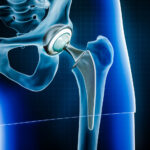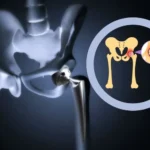Imagine you wake up in the morning, excited to begin the day’s activities, only to discover your knees protesting with each step. The basic act of climbing staircases or going for a casual walk becomes a daunting task. Moments like these cause us to consider the need for effective remedies, and for many, total knee replacement appears as a transforming choice.
Learn all about total knee replacement and educate yourself with the best advice from Top Knee surgery specialist Dr Simon Thomas.
What is total knee replacement?
Total knee replacement, also known as total knee arthroplasty, is a surgical treatment used to treat significant knee joint deterioration or degeneration that is frequently caused by osteoarthritis, rheumatoid arthritis, or injury.
During this operation, artificial components are used to replace the damaged sections of the knee joint, such as cartilage and bone.
The primary objective of total knee replacement is to relieve pain, restore function, and improve overall joint mobility, allowing patients to resume an active and rewarding lifestyle. This surgical technique is meticulously customised to each patient’s exact situation, offering a personalised approach to addressing their knee-related issues.
Precautions for total knee replacement
While following total knee replacement surgery, it is critical to take specific measures to ensure a smooth and effective recovery. While guidelines may differ according to individual circumstances and the surgeon’s instructions, basic precautions include:
- Avoiding intense sports: To avoid potential implant injury, avoid high-impact sports or activities that put too much stress on the knee joint, such as running and leaping.
- Carefully take the stairs: Take the stairs one at a time and always utilise a handrail for assistance. Before transferring the unoperated leg, place the surgical leg on the same step.
- Mindful Knee postures: Avoid postures that require severe bending or twisting of the knee, such as deep squats or prolonged kneeling. Follow the range of motion exercises prescribed by your healthcare staff.
- Regular Follow-Up Visits: Make sure to attend all planned follow-up appointments with your Knee doctor to track your progress and address any concerns as they arise.
- Medicine Adherence: Take prescription drugs, such as pain relievers and blood thinners, exactly as advised by your healthcare provider. Promptly communicate any concerns or bad reactions.
It is important to note that these precautions are broad suggestions, and patients should follow the precise directions offered by their knee specialist to get the best results in their recovery path.
Preventive measures for total knee replacement
Total knee replacement is frequently caused by conditions such as osteoarthritis, which may not be entirely preventable. However, certain lifestyle choices and measures can contribute to joint health and potentially prevent the need for knee replacement surgery.
- Keep Your Weight in Check: Carrying too much weight strains the knee joints and increases deterioration. One way to lower the risk of joint deterioration is to maintain a healthy weight through regular exercise and a balanced diet.
- Regular Exercise: Perform low-impact exercises to strengthen the surrounding muscles and encourage joint flexibility. Exercises that improve joint function and reduce the risk of osteoarthritis include swimming, walking, and cycling.
- Wear proper protective equipment: wearing equipment such as knee pads can help avoid damage to the knee joint if you play sports or engage in other activities that increase your risk of suffering a knee injury, such as basketball or skiing.
- Healthy Diet: Eat a diet that is high in antioxidants, vitamin D, and omega-3 fatty acids, among other elements that promote joint health. These nutrients support healthy joint function generally and may have anti-inflammatory properties.
Risks associated with total knee replacement
In general, total knee replacement is regarded as a safe and efficient treatment for those with significant damage to their knee joints. Like any operation, there are dangers involved and possible problems. They include:
- Infection: Although they are not frequent, surgical site infections can harm recovery. To reduce the danger, antibiotics are usually given both before and after surgery.
- Blood Clots: Patients who have surgery are more likely to develop deep vein thrombosis (clots forming in legs) in their legs or develop pulmonary emboli ( clots travelling to the lungs). Compression stockings and blood thinners are frequently used to lower this risk.
- Damage of Nerves or Blood Vessels: Rarely, during surgery, damage to the nerves or blood vessels around the knee may occur, causing numbness or problems with circulation. To reduce this danger, surgeons use preventative measures.
- Persistent Pain: Following surgery, some people may continue to feel pain. It could be required to pinpoint the problem and take additional action or make improvements to remedy it.
It’s crucial to remember that each person has a different chance of developing these problems, and many total knee replacement procedures go well. Patients are integral to their recovery by following postoperative care instructions and attending follow-up visits, and surgeons take safeguards and best practices to minimise hazards.
Having an extensive understanding of the advantages and possible risks of total knee replacement is crucial to helping you make decisions regarding the health of your joints. We urge you to set up a consultation if you’re thinking about this life-changing operation or if you have inquiries concerning your particular circumstance. Our mission as committed knee replacement specialist is to help you through the process and to collaborate with you to achieve better mobility and a more satisfying life. Take the next step to a healthy future without delay by getting in touch with us immediately for a customised evaluation and kind assistance.













